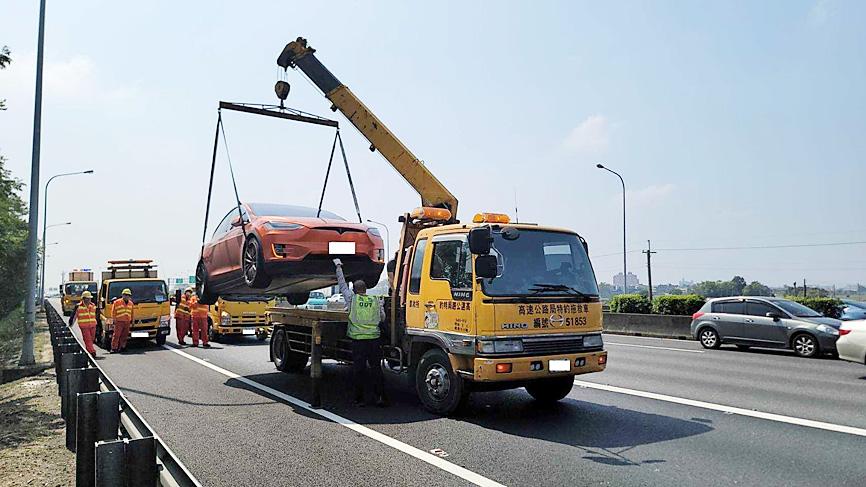The Consumers’ Foundation yesterday urged a recall of Tesla vehicles manufactured in 2019 to repair a battery defect that causes sudden power outages, sometimes while driving.
Of the 5,819 electric vehicles sold in Taiwan in 2020, the top three models were all made by the US firm, the foundation said.
Owing to repeated battery issues, 338 owners formed a self-help organization to seek redress and approached the foundation with their complaints.

Photo courtesy of Tesla self-help group via CNA
A survey by the organization found that most issues were found in Model X and Model S vehicles made between the end of 2018 and 2019, foundation secretary-general Hsu Tse-yu (徐則鈺) said.
Of the more than 1,400 vehicles in Taiwan fitting this description, at least 122 have had battery defects, he said.
Of these, 16 drivers reported losing power while driving, leaving them stuck on the road, Hsu said.
Owners have also complained that Tesla repair centers do not have enough stock to replace faulty batteries, requiring owners to leave their vehicle at a garage for months until the parts needed arrive, Hsu said.
Tesla often uses refurbished rather than new replacement batteries that are “sometimes older than the vehicle itself,” he added.
However, even after repair, one owner said they still encountered issues.
Tesla owners all know that when driving on the highway, “you have to drive on the outer lane so that when you lose power without warning again, it is easier to pull over,” they said.
Another owner, Hu Ching-yao (胡景堯), said that battery issues arise regardless of mileage and at any time, including after charging, after parking and while driving.
The Ministry of Transportation and Communications and agencies responsible for consumer protection should initiate an investigation into the issue, foundation chairman Terry Huang (黃怡騰) said.
Tesla’s Taiwan representative should also issue an explanation and offer a safety guarantee for repaired vehicles to put owners and other drivers at ease, he added.
Tesla Taiwan yesterday said that the company offers repair and replacement services to owners, and has sped up the resupply process.
The wait time for replacements has been shortened to two to three weeks, with plans to reduce it further to one week, it said.
While waiting for repairs, owners are granted a warranty extension equivalent to the wait time, a replacement vehicle or NT$2,000 in daily vouchers for transportation, as well as a discount for future tire replacement, it added.
Additional reporting by Yang Ya-min

Taiwan has received more than US$70 million in royalties as of the end of last year from developing the F-16V jet as countries worldwide purchase or upgrade to this popular model, government and military officials said on Saturday. Taiwan funded the development of the F-16V jet and ended up the sole investor as other countries withdrew from the program. Now the F-16V is increasingly popular and countries must pay Taiwan a percentage in royalties when they purchase new F-16V aircraft or upgrade older F-16 models. The next five years are expected to be the peak for these royalties, with Taiwan potentially earning

POSITIVE DEVELOPMENT: Japan and the US are expected to hold in-depth discussions on Taiwan-related issues during the meeting next month, Japanese sources said The holding of a Japan-US leaders’ meeting ahead of US President Donald Trump’s visit to China is positive news for Taiwan, former Japan-Taiwan Exchange Association representative Hiroyasu Izumi said yesterday. After the Liberal Democratic Party’s landslide victory in Japan’s House of Representatives election, Japanese Prime Minister Sanae Takaichi is scheduled to visit the US next month, where she is to meet with Trump ahead of the US president’s planned visit to China from March 31 to April 2 for a meeting with Chinese President Xi Jinping (習近平). Japan and the US are expected to hold in-depth discussions on Taiwan-related issues during the

‘LIKE-MINDED PARTNER’: Tako van Popta said it would be inappropriate to delay signing the deal with Taiwan because of China, adding he would promote the issue Canadian senators have stressed Taiwan’s importance for international trade and expressed enthusiasm for ensuring the Taiwan-Canada trade cooperation framework agreement is implemented this year. Representative to Canada Harry Tseng (曾厚仁) in an interview with the Central News Agency (CNA) said he was increasingly uneasy about Ottawa’s delays in signing the agreement, especially as Ottawa has warmed toward Beijing. There are “no negotiations left. Not only [is it] initialed, we have three versions of the text ready: English, French and Mandarin,” Tseng said. “That tells you how close we are to the final signature.” Tseng said that he hoped Canadian Prime Minister Mark Carney

STAY IN YOUR LANE: As the US and Israel attack Iran, the ministry has warned China not to overstep by including Taiwanese citizens in its evacuation orders The Ministry of Foreign Affairs (MOFA) yesterday rebuked a statement by China’s embassy in Israel that it would evacuate Taiwanese holders of Chinese travel documents from Israel amid the latter’s escalating conflict with Iran. Tensions have risen across the Middle East in the wake of US and Israeli airstrikes on Iran beginning Saturday. China subsequently issued an evacuation notice for its citizens. In a news release, the Chinese embassy in Israel said holders of “Taiwan compatriot permits (台胞證)” issued to Taiwanese nationals by Chinese authorities for travel to China — could register for evacuation to Egypt. In Taipei, the ministry yesterday said Taiwan